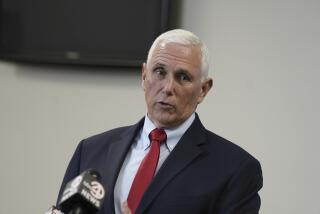Gore Assails Bush on Iraq, Domestic Woes
NEW YORK — Former Vice President Al Gore launched a broad attack Thursday on the Bush administration, charging that too many American soldiers are being killed in Iraq because of strategic miscalculations, serious misjudgments and historic mistakes that put them and the nation in harm’s way.
“The direction in which our nation is being led is deeply troubling to me -- not only in Iraq but also here at home on economic policy, social policy and environmental policy,” he said. “Millions of Americans now share a feeling that something pretty basic has gone wrong in our country and some important American values are being put at risk.”
Gore, who ran against George W. Bush in 2000, accused the president of practicing an “ideologically narrow agenda that has seriously divided America” and urged him to “rein in” Atty. Gen. John Ashcroft and Defense Secretary Donald H. Rumsfeld.
In a speech at New York University, Gore labeled as “true madness” the administration’s plans to build a new generation of smaller nuclear weapons at the same time that the United States and its allies are trying to curb the nuclear ambitions of North Korea and Iran. He spoke to a supportive audience of mostly young people who were invited by MoveOn.org, which bills itself as an “online grass-roots democracy group.”
In Crawford, Texas, near where Bush is vacationing, White House spokeswoman Claire Buchan dismissed Gore’s criticism, saying: “I think the American people know the president’s commitment to the security of the United States and to winning the war on terrorism.”
Gore’s speech came a day after former New York Gov. Mario M. Cuomo urged him to enter the race for the White House. Gore took himself out of the 2004 contest in December, and on Thursday, he repeated that he would not run, praising the current Democratic contenders. “I am not going to join them, but later in the political cycle, I will endorse one of them,” he said. Gore coupled a sharp critique of the administration’s handling of the war in Iraq with criticism of its economic and environmental policies.
He said it was wrong to believe that Saddam Hussein was partially responsible for the attack on the World Trade Center or that Iraq’s now-deposed leader was working closely with Osama bin Laden and actively supporting members of the Al Qaeda terrorist organization.
Gore said it also was a mistake to believe that Iraq was on the verge of building nuclear weapons and giving them to terrorists. The administration also miscalculated in apparently believing that American troops would be welcomed with open arms by cheering Iraqis who would quickly help them establish a stable, democratic nation, Gore added.
He said the administration also was incorrect in assuming that other nations -- many of which opposed the war -- would quickly fall into line after the ouster of the Iraqi regime and contribute money, troops and aid so U.S. taxpayers wouldn’t be stuck with a huge bill.
“Now, of course, everybody knows that every single one of these impressions was just dead wrong,” Gore said. “U.S. taxpayers are now having to spend a billion dollars a week [in Iraq].
“The removal of Saddam from power is a positive accomplishment in its own right for which the president deserves credit, just as he deserves credit for removing the Taliban from power in Afghanistan.
“But in the case of Iraq, we have suffered enormous collateral damage because of the manner in which the administration went about the invasion. And in both cases, the aftermath has been badly mishandled.”
Gore called the administration’s economic policies “another huge and threatening mess.”
He charged that the Bush tax cuts have failed to stimulate a lot of new business investment and jobs while most of the financial benefits are going to the wealthy.
“Millions of Americans got the impression that George W. Bush wanted to be a ‘healer, not a divider,’ a president devoted first and foremost to ‘honor and integrity,’ ” Gore said. “Yet far from uniting the people, the president’s ideologically narrow agenda has seriously divided America. His most partisan supporters have launched a kind of civil cold war against those with whom they disagree.”
More to Read
Get the L.A. Times Politics newsletter
Deeply reported insights into legislation, politics and policy from Sacramento, Washington and beyond. In your inbox three times per week.
You may occasionally receive promotional content from the Los Angeles Times.










